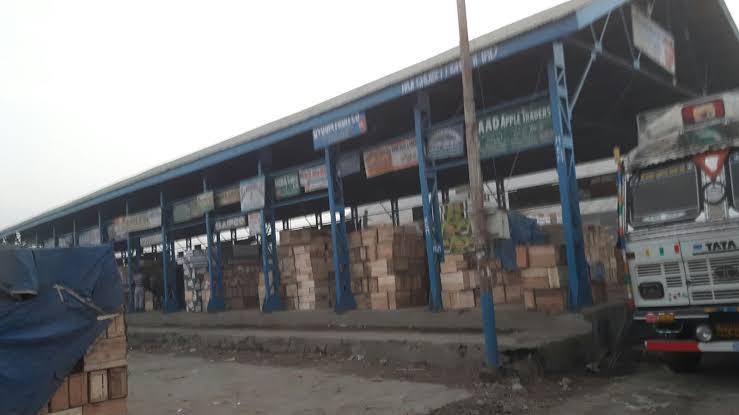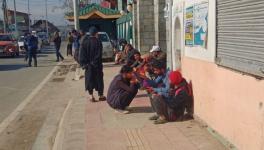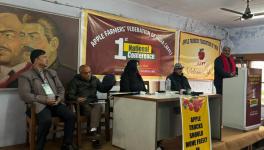Kashmir Clampdown: Losses Running into Thousands of Crores, Say Jammu Traders

Image for representational use only.Image Courtesy : The Rising Kashmir
Jammu: Business in Jammu is suffering major economic losses due to the ongoing crisis following the government-imposed clampdown. Presently, the trade leaders say, they are faced with losing business worth thousands of crores.
President of Jammu Chamber of Commerce Rakesh Gupta said that the business and commerce in Jammu and Kashmir is an “intra-state trade” and there is a major dependence of Jammu traders on the Kashmir market. “Whenever Kashmir is shut, we lose market. Right now, we are running losses in thousands of crores,” Rakesh said.
Kashmir remains under lockdown since August 5 when government imposed a clampdown in the wake of abrogation of Article 370 and bifurcated the J&K into two union territories. The government has ended restrictions in most parts, but a shutdown is being observed in Kashmir Valley to protest the revocation of special status.
Rakesh said what complicates the situation is that the businessmen in Kashmir have “volunteered for a self-imposed ban”.
“Many people are still not reconciling with the fact that Article 370 is gone, and it is in the past now which is affecting our business,” he added.
Horticulture, which is a major contributor to J&K’s economy, is one of the main sectors hit by the current political crisis.
Parveen Kumar Gupta, president of Jammu’s fruit and vegetable market told NewsClick that the 385-member mandi has invested about Rs 2,00 crore in the apple trade which almost entirely depends on growers from the valley.
Praveen has worked in Jammu mandi, which has about 3,000 employees, for 53 years and has been heading it since last 10 years. According to him, this is the first time they are faced with a crisis of such scale. “We have operated during the turmoil, during the unrests in 2008, 2010 and 2016, but this year is even more difficult,” Praveen said.
Like all other major mandis in the region, most of the agricultural trade in Jammu mandi is dependent on apples and walnut grown in the Kashmir Valley. According to the official data, apple industry contributes about 8% of the total GDP of J&K. The state’s Horticulture Department says that it is more than Rs 8000-crore industry, considered to be one of the largest employment generation sectors with more than 7 lakh families directly or indirectly dependent on it.
Praveen said the number of apple laden trucks arriving at Jammu mandi in September, the peak season, has decreased by 90%. “As compared to an average of 400 trucks per day operating last year, only 40 trucks are arriving in the market per day this time,” he said.
Praveen is also concerned about the employees and their families working in the market. Apart from the 3,000 employees whose salaries depend on the mandi trade body, there are hundreds of daily wage workers and labourers whose livelihood also depend on the work in the mandi.
Every year, a resident of Jammu, 21-year-old Sunil Kumar, works as a daily wage worker between August and September in the market. “Last year, I earned about Rs 1,500 per day, but this year, I am not able to earn more than Rs 300,” said Sunil while speaking to NewsClick.
Except in some areas of Anantnag, fruit growers in Sopore, Shopian, Kupwara are not able to work in their orchards due to threat from the militant groups. The militants have directed apple orchardists and traders to boycott this year’s harvest, creating a massive economic slump.
Several trade leaders and businessmen have been arrested in Kashmir and trade bodies have vocally opposed the decision of abrogation of Article 370. The traders are also supporting the shutdown in the valley which has hit the overall commerce in J&K.
Pertinently, the trade bodies in Jammu and Kashmir were earlier at loggerheads when traders in Jammu imposed what was referred to as an ‘economic blockade’ for months in the year 2008. After facing losses, traders in both the divisions reconciled following series of negotiations. There is, however, a difference of opinion on several key political issues including the status of Article 370 among the apex trade bodies.
“Despite difference of opinion on various issues, the Jammu and the Kashmir’s chambers have always worked together for the overall growth,” Rakesh said.
Another concern among the traders in Jammu fruit mandi is the government’s new Market Intervention Scheme involving National Agricultural Cooperative Marketing Federation of India Ltd. (NAFED) to procure apples directly from the growers in Srinagar.
Praveen said that the policy decision is against the traders in Jammu, who have invested crores of rupees in the sector. “It is a decision which has caused serious concerns among traders in Jammu and we expect the government to relook into the policy,” Praveen said.
Due to the ongoing crisis, the trade leaders say, the tourism which is another major business sectors in Jammu and Kashmir has also suffered a massive hit, something they say, cannot be reversed this year or until the situation improves.
Also read: Srinagar: Community Schools Become Way of Resistance Amid Lockdown
Get the latest reports & analysis with people's perspective on Protests, movements & deep analytical videos, discussions of the current affairs in your Telegram app. Subscribe to NewsClick's Telegram channel & get Real-Time updates on stories, as they get published on our website.
























